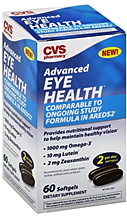
Many VisionAware readers write to us, inquiring about the effectiveness of supplements for treating age-related macular degeneration (AMD). Many readers also request clarification of the claims made by companies that produce a now-staggering array of eye health supplements:
- Do these supplements cure AMD?
- Do they slow its progression?
- Can they prevent it from developing?
- Do they match the recommendations of the landmark Age-Related Eye Disease Studies?
On August 2, 2017, the settlement of a class-action lawsuit against the CVS drugstore chain has shed light on the incorrect and deceptive claims of one such supplement: the CVS “Advanced Eye Health” formula.
CVS has agreed to a $645,000 settlement in a class-action lawsuit over sales of an eye health supplement it claimed contained ingredients found to slow the progression of macular degeneration, the leading cause of blindness in the United States. The lawsuit alleged those claims were false.
According to the lawsuit, the packaging of CVS Eye Health, sold next to Bausch & Lomb’s PreserVision supplement, claimed it was “Comparable to Ongoing Study Formula in AREDS 2.” In a clinical trial called the Age-Related Eye Disease Study 2, the National Institutes of Health has been studying the effects of different ingredients on the progression of macular degeneration, according to the complaint.
CVS agreed to pay class members $8 for each bottle purchased, up to $24, and stop selling the product.
Some Background on the Eye Supplement Class-Action Lawsuit
2014: Research in the Journal Ophthalmology
One of the first investigations, titled Ocular Nutritional Supplements: Are Their Ingredients and Manufacturers’ Claims Evidence-Based?, was published online ahead-of-print in the November 2014 issue of the journal Ophthalmology.
The authors of that study concluded that many of the most heavily promoted and top-selling “eye vitamin” products do not contain ingredients and dosages that are identical to the formulas that have been proven effective in the Age-Related Eye Disease Studies (AREDS and AREDS2), sponsored by the National Eye Institute, part of the United States National Institutes of Health (NIH).
Their findings established that, of the eleven popular supplements analyzed in the study, seven did not adhere to clinically proven formulas and all eleven made misleading claims regarding prevention and effectiveness. Most critically, there were no clear statements indicating that at present there is no proven benefit in using “eye vitamin” supplements for the primary prevention of eye diseases, such as age-related macular degeneration and cataracts. None had statements specifying that nutritional supplements have only been proven effective in people with specific stages of AMD.
In addition, while all 11 of the products’ promotional materials contained claims that the supplements “support,” “protect,” “help,” or “promote” vision and eye health, none had statements specifying that nutritional supplements have only been proven effective in people with specific stages of AMD.
2015: Class-Action Lawsuit Filed
Excerpted from CVS Faces Lawsuit Over “Advanced Eye Health” Supplement: Pills Do Not Contain the Formula Used in NIH Trial, via The Center for Science in the Public Interest:
CVS claims that its Advanced Eye Health dietary supplement is comparable to the formula that was found in a major government study to slow the progression of age-related macular degeneration (AMD). But according to a complaint filed in state court in California, the CVS formula does not contain vitamin C, vitamin E, zinc, or copper—all parts of the specific formula that the National Institutes of Health found to be effective at reducing the risk of AMD’s advancement.
“CVS is blatantly cheating older consumers who may fear developing age-related macular degeneration,” said David Schardt, senior nutritionist at the Center for Science in the Public Interest. “It’s a fraudulent bait-and-switch, since there’s no evidence that the formula used in the CVS formula will provide any benefit whatsoever regarding AMD.”
On its shelves, CVS places its Advanced Eye Health pills adjacent to Bausch + Lomb PreserVision supplements, which do contain the formula used in AREDS2, giving consumers another misleading indication that the CVS pills might contain the AREDS2 formula, according to the complaint.
The lawsuit was filed in Superior Court of California for Marin County on behalf of two California men with AMD who purchased CVS Advanced Eye Health, in the belief that it contained the AREDS2 formula.
What are the Age-Related Eye Disease Study (AREDS and AREDS2)?
The First Age-Related Eye Disease Study (AREDS)
The first Age-Related Eye Disease Study (AREDS) was a major clinical trial sponsored by the National Eye Institute to:
- Learn more about the history of, and risk factors for, age-related macular degeneration (AMD) and cataract;
- Evaluate the effect of high doses of antioxidants and zinc on the progression of AMD and cataract.
Results from the first AREDS trial, reported in October 2001, indicated that five years of supplementation with high doses of antioxidant vitamins, copper, and zinc reduced the risk of developing advanced AMD in 30% of individuals in the study who took the supplements and had already-existing moderate to advanced dry or wet AMD.
The original AREDS formulation included:
- 500 milligrams (mg) of vitamin C
- 400 international units of vitamin E
- 15 mg beta-carotene (for non-smokers only)
- 80 mg zinc as zinc oxide
- 2 mg copper as cupric oxide (to avoid anemia with high zinc intake)
The Second Age-Related Eye Disease Study (AREDS2)
In May 2013, The National Eye Institute concluded the Age-Related Eye Disease Study 2 (AREDS2), which tested several changes to the original AREDS formulation:
- The primary goal of the AREDS2 study was to determine if (a) adding omega-3 fatty acids or (b) lutein and zeaxanthin (the anti-oxidants found in dark green leafy vegetables) to the original AREDS formulation would make it more effective for reducing the risk of advanced AMD and cataract.
- The AREDS2 research group also substituted lutein and zeaxanthin for beta-carotene, which prior studies had associated with an increased risk of lung cancer in smokers.
The researchers concluded that while omega-3 fatty acids had no effect on the formulation, lutein and zeaxanthin together appeared to be a safe and effective alternative to beta-carotene. Therefore, the addition of lutein and zeaxanthin to – and the subtraction of beta carotene from – the original AREDS supplement formula were recommended by AREDS2.
The AREDS2 formulation now includes:
- 500 milligrams (mg) of vitamin C
- 400 international units of vitamin E
- 80 mg zinc as zinc oxide
- 2 mg copper as cupric oxide (to avoid anemia with high zinc intake)
- 10 mg lutein
- 2 mg zeaxanthin
A Cautionary Note, However
There is some new evidence that individuals whose AMD progression is slowed by the AREDS supplements were of a particular genetic makeup and that the supplements may speed AMD progression in those with a different genetic makeup.
This has prompted some scientists to call for genetic testing of everyone with macular degeneration before prescribing supplements, but the evidence is not sufficient for all scientists to agree on this. Individuals should discuss this with their own eye care specialists.
Components of the CVS Advanced Eye Health Supplement
What did the disputed CVS supplement contain? According to the settlement announcement,
Bausch + Lomb’s PreserVision contains the formula found to be effective by [the AREDS2 trial]. But CVS Eye Health does not, according to the plaintiffs. The CVS supplement contained omega-3 fatty acids and carotenoid substitutes for beta-carotene — none of which have been proven effective on their own in slowing macular degeneration — but did not contain vitamin C, vitamin E, zinc, or copper, according to the lawsuit.
My Own Real-Life Examples of Supplement Claims
As a vision professional, I have long been interested in presenting accurate information about AREDS and AREDS2 supplements, including (a) the ingredients that have been proven effective in AREDS clinical trials and (b) the as-yet unproven ability of “eye vitamin” supplements to prevent the onset of AMD and cataracts.
As an example, I compared and contrasted the ingredient lists of Bausch + Lomb PreserVision Eye Vitamin and Mineral Supplement AREDS2 Formula and Alcon I-Caps Eye Vitamin and Mineral Supplement AREDS Formula (recommended for a relative).
Bausch + Lomb PreserVision AREDS2 Formula
PreserVision Supplement Facts
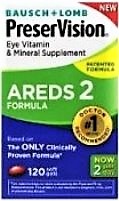
- Serving size: 1 soft gel
- Dosage: 2 per day
- Vitamin C: 500 mg
- Vitamin E: 400 IU
- Zinc: 80 mg
- Copper: 2 mg
- Lutein: 10 mg
- Zeaxanthin: 2 mg
Comparison: AREDS2 Recommendations
- Vitamin C: 500 mg
- Vitamin E: 400 IU
- Zinc: 80 mg
- Copper: 2 mg
- Lutein: 10 mg
- Zeaxanthin: 2 mg
Comparison Results
It’s a perfect match. See for yourself:
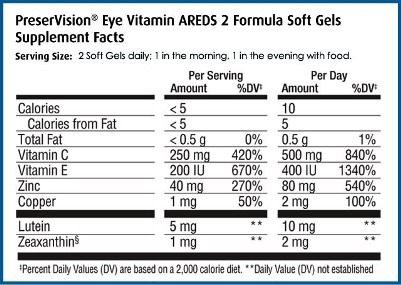
PreserVision Eye Vitamin AREDS2 Formula
Soft Gels Supplement Facts
Alcon I-Caps Eye Vitamin and Mineral Supplement AREDS Formula
I-Caps Supplement Facts
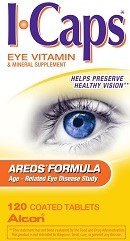
- Serving size: 2 tablets
- Dosage: 4 tablets per day
- Vitamin A: 28,640 IU
- Vitamin C: 452 mg
- Vitamin E: 400 IU
- Calcium: 120 mg
- Zinc: 69.6 mg
- Copper: 1.6 mg
Comparison: Original AREDS Recommendations
- Vitamin C: 500 mg
- Vitamin E: 400 IU
- Beta-Carotene: 15 mg
- Zinc: 80 mg
- Copper: 2 mg
Comparison: AREDS2 Recommendations
- Vitamin C: 500 mg
- Vitamin E: 400 IU
- Zinc: 80 mg
- Copper: 2 mg
- Lutein: 10 mg
- Zeaxanthin: 2 mg
Comparison Results
Not even close to either AREDS or AREDS2. See for yourself:
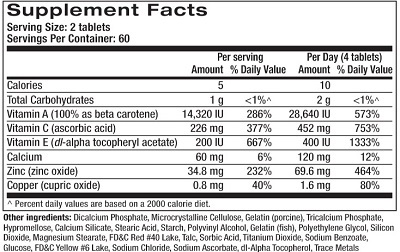
I-Cap Eye Vitamin and Mineral AREDS Formula Supplement Facts
Note: Values shown are for a two-tablet dosage.
Daily recommended dosage is 4 tablets.
What You Can Do as a Consumer
The Ophthalmology researchers concluded that “The majority of top-selling ocular nutritional supplements did not contain the identical ingredient dosages of the AREDS or AREDS2 formula and had product description claims that lacked level 1 evidence, underscoring the importance of ophthalmologists educating their patients on the evidence-based role of nutritional supplements in the management of eye health.” [Editor’s note: Level 1 evidence represents research results that meet an extensive set of quality criteria which minimizes researcher bias.]
Most importantly, be sure to talk with your ophthalmologist or optometrist to learn if you could benefit from taking AREDS2 supplements.